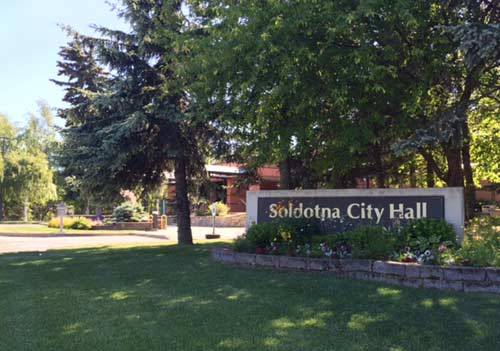At Wednesday’s meeting, the Soldotna City Council is scheduled to introduce two ordinances that begin the process of regulating commercial marijuana establishments in the city.
One ordinance would amend the zoning code — establishing definitions, allowable uses and general standards, according to a memo from Interim City Manager Stephanie Queen. The other sets forth policies like additional sales tax figures, prohibition of on-site consumption and a process for the council to use when reviewing state-issued licenses.
Currently, the exact percentage of additional sales tax has been left blank, awaiting an amendment by the council to add a specific tax rate or to remove the additional tax completely, according to the memo. The sales tax, if enacted, would be the first additional sales tax levied by a municipality in the borough and would not go into effect until January 2019 because of various beaurocratic changes the borough would need to make in order to collect the taxes on behalf of the city.
The ordinance also bans all marijuana use “in public,” which includes city-owned property and even privately owned property where people are able to congregate. This ordinance effectively would ban on-site consumption of marijuana, “even if the State of Alaska at some point creates a new endorsement for on-site consumption,” the memo states.
The other ordinance was recommended by the Planning Commission following their Jan. 3 meeting and sets forth several zoning regulations.
“The Planning and Zoning Commission has proposed that Testing Facilities be allowed as a principal permitted use in the Limited Commercial zoning district,” according to Queen’s memo. “They are also recommending that Testing, Manufacturing and Retail marijuana establishments be allowed as principal permitted uses in the Commercial zoning district.”
The commission recommended the prohibition of all commercial cultivation of any size within the city, regardless of zoning district. The commission also recommend that the city adopt a 500-foot buffer zone from schools, colleges, universities, state licensed day cares, recreation or youth centers, places of worship and correctional facilities. They recommended that the city adopt a 200-foot buffer zone from libraries, substance abuse treatment facilities, transitional housing, recovery facilities and from city parks.
Neither ordinance discusses a limitation to the number of licenses the city can issue. The administration isn’t recommending the city cap the number of licenses to avoid an artificial market condition that gives the first businesses protection from competition.
“Another consideration, is that we would need to create an additional process, for how to deal with instances where there are fewer licenses available than applications,” Queen said.
This issue would arise if two businesses applied for one license. Queen also mentioned issues that arise when an existing licensee closes down.
“My recent work in coordinating liquor licenses, has highlighted many consequences and undesirable situations arise out of the fact that licenses were ‘capped’ decades ago,” Queen said. “With marijuana, we recommend that the City not make the same choice in setting up the regulatory framework, and instead rely on the market conditions to dictate how many businesses can be supported in our community.”
The city council will hold public hearing on these ordinances on Jan. 24 and Feb. 14.
Reach Kat Sorensen at kat.sorensen@peninsulaclarion.com.

